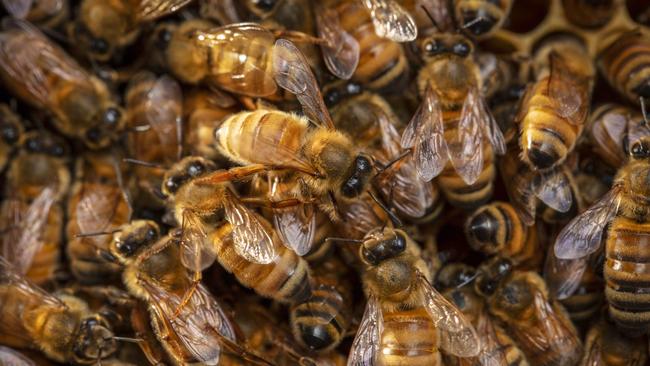Bombs and illicit drugs are nectar to a trained honeybee
Sniffer bees are able to seek out drugs, explosives, pesticides and radioactive metals, according to a British academic.

Sniffer bees are able to seek out drugs, explosives, pesticides and radioactive metals, according to a British academic who is training them to locate landmines.
Honeybees will be ready for deployment searching out the mines in between five and 10 years and have already been trained to identify other dangerous or illicit materials.
Ross Gillanders, a senior researcher at the University of St Andrews, releases bees near suspected minefields to pick up traces of explosives.
Bees are trained using a Pavlovian association between the odour of explosives and sugar water to train the bees to think the scent belongs to nectar.
The bees can then detect explosives from distances of up to a couple of kilometres. When they are sent out, they settle almost instantly on the spot where the bomb is hidden. The system would save people from risking their lives on the detection of bombs and landmines.
Dr Gillanders said experiments had repeatedly shown positive results. His NATO-funded project uses specially designed “pre-concentrators” in the hives to monitor the presence of explosives in the areas where the bees are released.
Results are confirmed within about 24 hours before the bees are trained and sent to hunt out the mines.
“At the moment we know they can detect the landmines from about 100 metres’ distance but that should go up to kilometres. It should happen immediately once they’re trained and released,” Dr Gillanders said.
However, when the bees find the explosives but no reward of nectar they quickly realise that they have been duped and cease to detect the explosives, he added. “They get used to it so they realise after a couple of days that they have been hoodwinked. Every few days you have to retrain them but hopefully by that time they have found the explosives.”
He said that another drawback of working with bees was that they could be unpredictable. During one field trial he was swarmed and left with 20 stings on an ankle that was not covered by his beekeeping suit. “They seemed to know where to go for — it was the only part that was exposed,” he said.
He works in a team with a scientist who used bees to map part of the exclusion zone around Chernobyl after the nuclear disaster, measuring caesium levels in the pollen they collect.
Detection works in two stages. Bees are sent out into the terrain and scanned on their return. If they have picked up traces on their bodies while out, specially trained bees are then sent to locate the explosives. As they converge on a mine, an unmanned drone monitors the bees.
In a paper published in 2015, researchers at the University of Cologne claimed that bees could eventually replace dogs in detecting drugs at airports.
Training bees is quicker and cheaper than training dogs and their upkeep and feeding is simpler and cheaper. They are considered at least as sensitive as dogs, and dogs are known to underperform when poorly treated or kept in unfavourable conditions.
In one US project, bees were used to detect explosives in vehicles, on people at checkpoints and over water. The bees were refrigerated and taped into harnesses, undergoing Pavlovian conditioning that prompted them to stick out their proboscises- like tongues — when exposed to the target smell.
A bee would normally only extend its proboscis when feeding. They were put to work inside a black box, with monitors tracking the extension of the proboscis. The bees were successful spotting C-4 plastic explosive and TNT.
The Times


